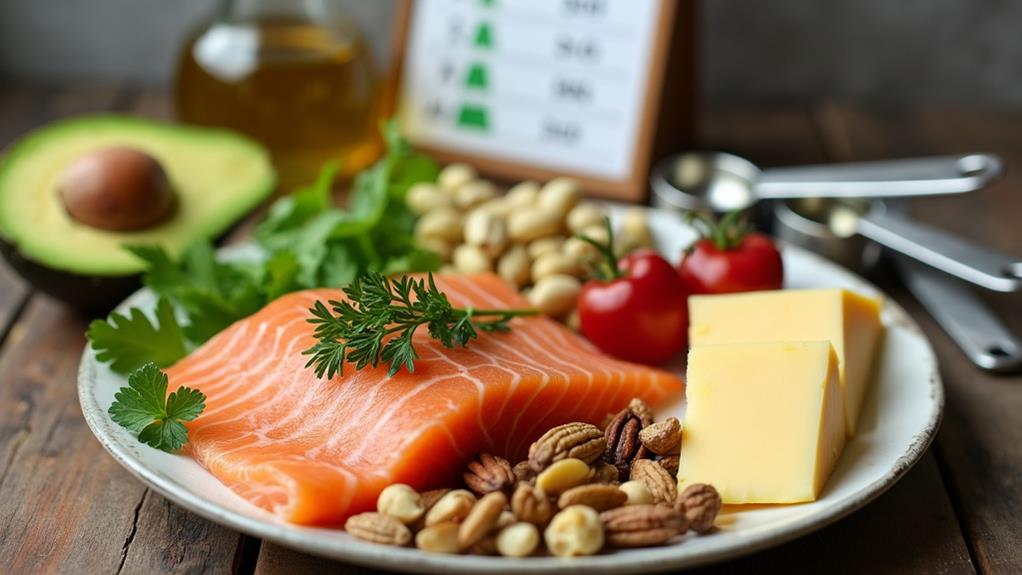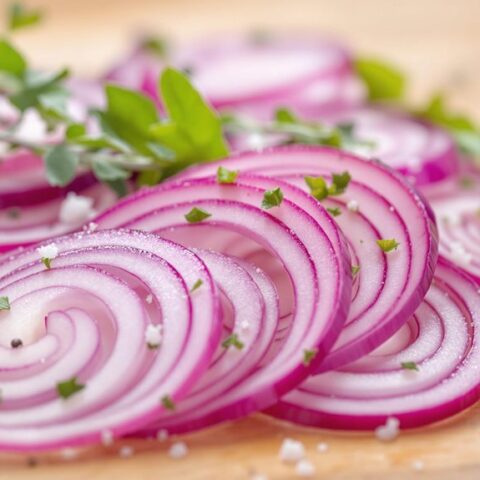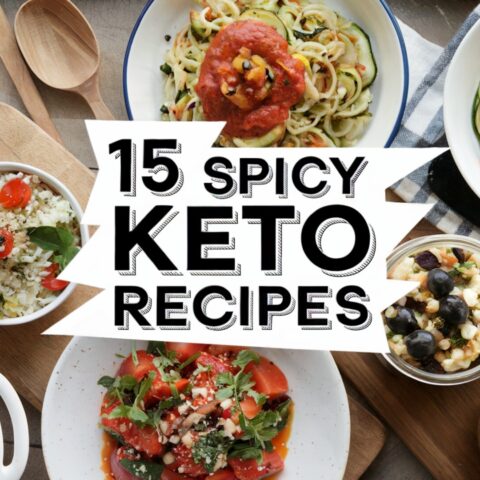
On a ketogenic diet, fat intake should comprise 70-80% of daily calories, amounting to approximately 165-220 grams of fat per day for a 2,000-calorie diet. This high-fat percentage is essential to achieving and maintaining ketosis, where the body shifts from using carbohydrates to fats as the primary energy source. Quality fat sources such as avocados, nuts, and fatty fish are recommended for their additional health benefits. The specific amount of fat required can vary based on individual caloric needs and metabolic responses. Explore this framework further to optimize your ketogenic dietary plan.
Key Takeaways
- Ketogenic diet fat intake typically ranges from 70-80% of total daily calories.
- For a 2,000-calorie diet, this translates to approximately 165-220 grams of fat daily.
- A 150-pound individual may need about 150-189 grams of fat to maintain ketosis.
- Daily fat intake should be adjusted based on individual caloric needs and activity levels.
- Healthy fat sources include olive oil, avocados, nuts, coconut oil, and fatty fish.
Understanding the Keto Diet
Understanding the Keto Diet requires a meticulous examination of its macronutrient composition and metabolic implications. Widely misunderstood, the ketogenic diet is often misrepresented in popular media, leading to several keto misconceptions.
A standard ketogenic diet consists of 70-80% of daily caloric intake from fats, 5-10% from carbohydrates, and 10-20% from proteins. This stringent macronutrient ratio is designed to induce ketosis, a metabolic state where the body efficiently uses fat instead of carbohydrates as its primary energy source. The shift to ketosis usually takes 3-4 days but can vary based on individual activity levels and metabolism. During this period, individuals may experience symptoms like increased thirst and fatigue as the body adapts.
For a 150-pound individual consuming 2,000 calories per day, this translates to approximately 189 grams of fat daily. This dietary shift emphasizes foods rich in healthy fats, such as avocados, nuts, and olive oil, while restricting carbohydrate intake to less than 50 grams per day.
The adaptation period can take 3-5 weeks, during which the body transitions from burning glucose to utilizing fat for fuel. Dietary flexibility within these parameters can be challenging but is achievable with careful planning and nutritional expertise.
Understanding these critical aspects of the keto diet can help dispel common misconceptions and provide a clear framework for those considering this high-fat, low-carbohydrate dietary approach.
Importance of Fat in Keto
Fat plays a pivotal role in the ketogenic diet by driving the production of ketones, which the body utilizes as an alternative energy source in the absence of carbohydrates.
Adequate fat intake not only guarantees sustained energy levels and satiety but also supports hormonal balance, which is essential for overall metabolic health.
Including healthy fats like olive oil, coconut oil, and avocado oil can enhance the benefits of the keto diet.
Prioritizing healthy fats can optimize these benefits, making it easier to maintain ketosis and adhere to the diet.
Role in Ketosis
Achieving and maintaining ketosis in a ketogenic diet hinges greatly on a high intake of dietary fat, which typically constitutes 70-80% of daily caloric intake. This macronutrient distribution is essential for inducing ketosis, a metabolic state where the body shifts from utilizing carbohydrates to burning fat for fuel.
Limiting carbohydrate intake to less than 50 grams per day is critical to initiate this process, underscoring the necessity for heightened fat consumption.
In the state of ketosis, the liver plays an important role by converting both dietary and stored fat into ketones. These ketones then serve as an alternative energy source, particularly for the brain, which ordinarily requires approximately 120 grams of glucose daily.
For example, a 150-pound individual might need to consume around 189 grams of fat daily to maintain the macronutrient ratios necessary for sustaining ketosis.
The ketosis benefits are multi-faceted, particularly in enhancing fat metabolism. The increased fat consumption not only fuels the body but also helps in regulating appetite hormones, thereby preventing fatigue and hunger.
This meticulous balance of macronutrients is fundamental for the effective functioning of a ketogenic diet, ensuring sustained energy levels and metabolic efficiency.
Energy and Satiety
A significant portion of energy and satiety in a ketogenic diet is derived from the high intake of dietary fat, which forms the cornerstone of this nutritional approach. On a ketogenic diet, 70-80% of total daily caloric intake should come from fats, translating to roughly 150-200 grams for a standard 2,000-calorie diet.
This ample fat intake is essential for both fat digestion and hunger regulation, as consuming healthy fats increases satiety, curbing hunger and reducing overall caloric consumption, thereby supporting weight loss efforts.
Fat's role in slowing down digestion and the absorption of carbohydrates leads to more stable blood sugar levels and prolonged feelings of fullness. This mechanism is critical for maintaining energy levels throughout the day.
Furthermore, high-fat diets facilitate ketone production, offering an efficient alternative energy source for the brain, which can enhance mental clarity and focus.
Additionally, the presence of dietary fat is necessary for the absorption of fat-soluble vitamins (A, D, E, and K), which are important for overall health.
Consequently, adequate fat intake on a ketogenic diet not only supports immediate energy needs and satiety but also guarantees the long-term nutritional well-being of individuals adhering to this dietary regimen.
Hormonal Balance
Understanding the importance of fat in maintaining hormonal balance on a ketogenic diet is fundamental for appreciating its broader health benefits.
Healthy fats are essential to the production of hormones, including critical sex hormones like estrogen and testosterone. These hormones are indispensable for reproductive health and overall wellness. A ketogenic diet, comprising approximately 70-80% fat, helps stabilize insulin levels, which can mitigate hormonal fluctuations and reduce symptoms associated with insulin resistance.
Adequate fat intake is also important for the synthesis of steroid hormones. These hormones play significant roles in regulating metabolism, immune function, and inflammation. The presence of healthy fats in the diet further supports the absorption of fat-soluble vitamins such as A, D, E, and K. These vitamins contribute greatly to hormonal health and balance, enhancing the body's ability to maintain ideal physiological functions.
Research indicates that a balanced intake of healthy fats can positively influence mood and mental health by stabilizing cortisol levels. This stabilization helps reduce stress-related hormonal fluctuations, thereby contributing to emotional well-being.
Consequently, understanding fat metabolism within the context of a ketogenic diet is critical for achieving and maintaining hormonal balance.
Daily Fat Intake Guidelines

Maneuvering the dietary landscape of a ketogenic regimen requires precise adherence to specific macronutrient ratios, particularly regarding daily fat intake. On a standard ketogenic diet, fat intake typically comprises 70-80% of total caloric intake. For an individual consuming a 2,000-calorie diet, this translates to approximately 165-220 grams of fat per day.
These guidelines are not rigid; daily adjustments should be made based on personal caloric needs and activity levels. Regular tracking of carbohydrate intake is also vital to prevent any disruption in ketosis. For example, a 150-pound woman may aim for around 189 grams of fat daily, fine-tuning her intake to match her specific energy expenditure.
Monitoring macronutrient ratios is fundamental for achieving and maintaining ketosis. The ketogenic diet generally recommends that 5-10% of calories come from carbohydrates and 10-20% from protein, leaving the majority of caloric intake to be derived from fats.
It is important to confirm that the fats consumed are of high quality to support overall health and nutritional balance. In addition, adequate hydration and electrolyte management are critical, as the metabolic shift towards higher fat intake can affect body hydration levels, especially during the initial change to ketosis.
This meticulous approach to fat intake guarantees the effective and sustainable practice of a ketogenic diet.
Healthy Fat Sources
While monitoring macronutrient ratios is fundamental for sustaining ketosis, the quality of fat sources also plays a pivotal role in the effectiveness and healthiness of a ketogenic diet. Avocados, with their rich monounsaturated fats and fiber, offer numerous avocado benefits including heart health and balanced blood sugar levels. Nut varieties like almonds and walnuts provide a combination of healthy fats, protein, and fiber, contributing to a reduced risk of heart disease.
Incorporating fatty fish options such as salmon and sardines into your diet guarantees a robust intake of omega-3 fatty acids, which are known for their anti-inflammatory properties and cardiovascular benefits. Additionally, oil types like olive oil are rich in vitamin E and antioxidants, making them ideal for cooking and salad dressings.
Coconut oil is particularly valuable for keto dieters due to its medium-chain triglycerides (MCTs), which effectively promote ketosis. The versatility of coconut uses allows it to be integrated into various dishes and beverages with ease, enhancing both flavor and nutritional profile.
| Fat Source | Key Nutrients | Health Benefits |
|---|---|---|
| Avocados | Monounsaturated fats, fiber | Heart health, blood sugar balance |
| Nuts (Almonds, Walnuts) | Healthy fats, protein, fiber | Reduced risk of heart disease |
| Fatty Fish (Salmon, Sardines) | Omega-3 fatty acids | Anti-inflammatory, cardiovascular benefits |
| Olive Oil | Vitamin E, antioxidants | Heart health, versatile for cooking and dressing |
| Coconut Oil | Medium-chain triglycerides (MCTs) | Promotes ketosis, versatile in culinary uses |
Calculating Your Fat Needs

Determining your fat needs on a ketogenic diet requires a precise calculation based on your daily caloric intake and the target macronutrient ratio. Typically, fat intake on a ketogenic diet comprises about 70-80% of total daily calories.
For example, a 150-pound individual consuming 2,000 calories per day would need approximately 150-189 grams of fat to maintain ketosis. It's important to regularly review and adjust your macro targets based on your tracking data and progress to guarantee ideal results.
To ascertain your specific fat needs, first calculate your total daily caloric intake. Then, multiply this number by your desired percentage of fat intake. For instance, if your caloric intake is 2,000 calories and you aim for 75% from fat, you would need around 167 grams of fat. This is derived from 2,000 calories multiplied by 0.75 to get 1,500 calories from fat, which is then divided by 9 (calories per gram of fat).
Additionally, consider activity level adjustments when determining fat intake. More active individuals may require higher fat intake to meet increased energy demands while still maintaining ketosis.
Prioritizing high-quality fat sources such as avocados, nuts, and olive oil is essential to ascertain adequate nutrient intake while adhering to your fat gram target.
Balancing Macronutrients
Balancing macronutrients on a ketogenic diet involves adhering to an ideal intake of approximately 70-80% fat, 10-20% protein, and 5-10% carbohydrates.
For a 150-pound individual, this translates to around 189 grams of fat, 86 grams of protein, and 25 grams of carbohydrates daily, ensuring that energy needs are met while maintaining ketosis.
Emphasizing high-quality fat sources and closely monitoring protein and carbohydrate limits is essential for achieving best metabolic outcomes.
These dietary guidelines have been shown to stabilize insulin levels and enhance fat oxidation, further supporting sustainable weight loss and energy balance on a ketogenic regimen.
Ideal Fat Intake
Achieving the ideal fat intake on a ketogenic diet involves carefully balancing macronutrients to support ketosis and overall health. Fat adaptation is vital for shifting into a state where fats become the primary energy source.
On a standard ketogenic diet, approximately 70-80% of daily caloric intake should come from fats, translating to about 150-189 grams of fat for a 2,000 calorie diet. This high fat intake aids in maintaining ketosis and provides sustained energy.
Dietary adjustments are necessary to optimize fat intake. For instance, a 150-pound woman may target a macronutrient breakdown of 189 grams of fat, 86 grams of protein, and 25 grams of carbohydrates to meet her dietary goals.
Prioritizing healthy fats, such as those from avocados, olive oil, and nuts, while avoiding trans fats and processed oils, is fundamental for balanced nutrition.
Regular monitoring of fat intake, along with energy levels and satiety, helps fine-tune the diet. These adjustments not only aid in maintaining ketosis but also guarantee overall well-being.
Adhering to these guidelines fosters a more effective and health-conscious approach to the ketogenic lifestyle.
Protein and Carb Limits
Maintaining the delicate balance of macronutrients on a ketogenic diet is vital for sustaining ketosis and promoting overall health. On a standard ketogenic diet, this balance typically consists of 70-80% fat, 10-20% protein, and 5-10% carbohydrates. For a 150-pound individual, this translates to approximately 25 grams of carbohydrates, 86 grams of protein, and 189 grams of fat daily.
Protein intake must be moderated as excessive protein can be converted to glucose through gluconeogenesis, potentially disrupting ketosis. Ideal protein sources should be lean and high-quality, such as poultry, fish, and tofu, to support muscle maintenance without surpassing the recommended intake. This guarantees that the body remains in a fat-burning state while preserving muscle mass.
Carbohydrate consumption should be limited to less than 50 grams per day, emphasizing non-starchy vegetables and low-carb fruits. Some individuals may employ carb cycling, a strategy that involves periodically increasing carbohydrate intake to support metabolic flexibility and prevent metabolic slowdown. However, this should be done cautiously to avoid exiting ketosis.
Balancing these macronutrients is vital for enhancing fat utilization, sustaining ketosis, and achieving the desired health outcomes of a ketogenic diet.
Common Keto Mistakes

Many individuals starting a keto diet encounter several common pitfalls that can hinder their progress and overall health. One prevalent keto pitfall is the misconception that all fats are beneficial. While the keto diet emphasizes high fat intake, it is vital to prioritize healthy fats.
Consuming approximately 70-80% of total daily calories from fats is recommended to achieve and maintain ketosis. However, it is important to avoid unhealthy trans fats and ultra-processed oils, which can negatively impact health.
Another common issue is the keto flu, which can be managed by staying hydrated and replenishing electrolytes.
Another frequent error is excessive protein consumption. While protein is an important macronutrient, consuming too much can lead to gluconeogenesis, where protein is converted to glucose, potentially disrupting ketosis.
It is advisable to moderate protein intake to about 10-20% of total calories.
Moreover, skipping essential micronutrients by not including a variety of allowed non-starchy vegetables can lead to nutrient deficiencies. A well-rounded keto diet should incorporate a diverse range of vegetables to guarantee adequate vitamin and mineral intake.
Lastly, not paying attention to hydration and electrolyte balance, especially during the initial adaptation phase, can result in symptoms commonly referred to as "keto flu," including fatigue and headaches.
Proper hydration and electrolyte management are vital for avoiding these symptoms.
Adjusting Fat for Weight Goals
Adjusting fat intake on a ketogenic diet is a critical component for aligning dietary practices with specific weight goals. Typically, fat intake on a keto diet constitutes about 70-80% of total daily calories, equating to approximately 150-189 grams for a 150-pound individual consuming 2,000 calories daily.
It's important to emphasize quality fat sources such as avocados, nuts, and olive oil to support ketosis effectively. To optimize weight management, it is vital to monitor individual hunger signals and energy requirements, particularly following initial weight loss phases. This helps guarantee the body efficiently utilizes fat for energy.
Gradual increases in fat consumption facilitate fat adaptation, allowing the body to shift smoothly into ketosis without significant hunger or energy fluctuations. High-quality fat sources like avocados, nuts, and olive oil should be prioritized to maintain a balanced intake.
Regularly tracking macronutrient ratios is paramount; adjusting fat intake based on personal weight loss progress enhances the diet's adherence and effectiveness. Understanding and responding to hunger signals can prevent overeating and support sustained weight goals.
As the body adapts to utilizing fat as its primary energy source, these adjustments become pivotal in achieving and maintaining desired weight outcomes. This evidence-based approach guarantees a personalized and effective ketogenic experience.
Monitoring Ketosis
After aligning fat intake with weight management goals, it is paramount to confirm that the body remains in a state of ketosis for ideal ketogenic diet benefits. Monitoring ketone levels through ketone testing methods such as blood, breath, or urine tests is essential. Blood ketone levels within the range of 0.5 to 3.0 mmol/L typically indicate nutritional ketosis, suggesting effective metabolic adaptation.
Maintaining ketosis requires careful dietary management, particularly in tracking carbohydrate intake to make sure it remains below 50 grams per day. This restriction supports the body's shift to utilizing fat for energy instead of glucose. Regularly measuring fat intake and adjusting based on energy levels and weight loss objectives can optimize ketosis and prevent potential stalls.
Here is a comparative table of ketone testing methods:
| Method | Accuracy | Typical Range for Ketosis |
|---|---|---|
| Blood Test | High | 0.5 – 3.0 mmol/L |
| Breath Test | Moderate | 2 – 40 ppm |
| Urine Test | Variable | 15 – 80 mg/dL |
Individual responses to dietary fat can vary, necessitating adjustments to maintain effective ketosis. By continuously monitoring ketone levels and adapting fat intake, one can confirm sustained metabolic adaptation and enhanced ketogenic diet outcomes.
Long-Term Health Considerations
Long-term adherence to a ketogenic diet necessitates careful consideration of potential health implications. Although the ketogenic diet can offer short-term benefits, prolonged use raises several health concerns that require vigilant management.
1. Nutrient Deficiencies: The exclusion of carbohydrate-rich food groups, such as fruits and whole grains, can result in insufficient intake of essential vitamins and minerals. This necessitates careful planning to maintain nutrient balance and prevent deficiencies.
Additionally, ensuring adequate intake of electrolyte-rich foods like avocados and spinach can help mitigate some of these deficiencies.
2. Cardiovascular Risks: Research indicates that high-fat consumption over extended periods can increase cholesterol levels, thereby elevating the risk of cardiovascular diseases. Regular monitoring of lipid profiles is essential to mitigate these risks.
Individuals should also be mindful of raised LDL cholesterol levels due to high saturated fat intake.
3. Kidney Stones and Digestive Issues: The ketogenic diet can lead to kidney stones and digestive issues if hydration needs and calcium intake are not adequately managed. Ensuring proper hydration and sufficient calcium intake is vital for preventing these complications.
Additionally, the lack of dietary variety may impact gut health over time. Periodic long-term reevaluation of dietary patterns is advisable, including the potential reintroducing carbohydrates to sustain overall health.
Understanding these long-term health considerations is important for anyone committing to a ketogenic lifestyle, as it helps in preventing serious health complications.
Tips for Staying on Track

Maintaining adherence to a ketogenic diet necessitates strategic planning and consistent monitoring to guarantee sustained success. Achieving a daily fat intake of 70-80% of total calories, approximately 189 grams for a 150-pound individual consuming 2,200 calories, is essential for peak ketosis.
Utilizing food tracking apps can be instrumental in monitoring macronutrient intake, ensuring that the balance of fats, proteins, and carbohydrates aligns with ketogenic requirements. Incorporating meal prepping as part of your routine helps avoid the temptation of non-keto snacks, particularly during busy periods. Preparing meals in advance with a variety of healthy fats such as avocados, olive oil, and nuts can keep your diet interesting and aligned with fat intake goals.
Additionally, employing effective hydration strategies is vital. Dehydration can lead to fatigue and cravings, potentially compromising adherence to the diet. Ensuring adequate water intake and replenishing electrolytes can mitigate these risks, promoting better overall health and diet adherence.
Frequently Asked Questions
How Many Grams of Fat Should I Eat a Day on Keto?
To determine your daily fat intake on a keto diet, aim for 70-80% of total calories from fat. For example, with a 2,000-calorie intake, this equates to approximately 150-189 grams, maintaining appropriate macronutrient balance.
What Happens if You Don't Eat Enough Fat on Keto?
Insufficient fat intake on a ketogenic diet can impede fat adaptation, leading to suboptimal energy levels, poor hunger management, and potential nutrient imbalances. This can result in fatigue, increased cravings, and diminished overall health and cognitive function.
Can I Eat as Much Fat as I Want on Keto?
While the ketogenic diet emphasizes high-fat intake, consuming unlimited amounts can be detrimental. Practicing portion control and choosing healthy fat sources like avocados and nuts is essential to maintaining balanced nutrition and supporting metabolic health.
What Is the Minimum Fat Percentage for Keto?
The minimum fat percentage for keto is approximately 60% of total daily calories. This addresses common keto misconceptions and underscores the importance of prioritizing healthy fat sources such as avocados, nuts, and oils for ideal ketone production and health.
Conclusion
In summary, the ketogenic diet necessitates a precise intake of fats to maintain ketosis and achieve desired health outcomes. Adhering to daily fat intake guidelines, which typically range from 60-75% of total caloric intake, is essential. Selecting healthy fat sources and calculating individual fat needs based on specific weight goals and activity levels guarantees ideal results. Monitoring ketosis and considering long-term health implications further supports the efficacy and sustainability of the ketogenic dietary approach.










No Comments